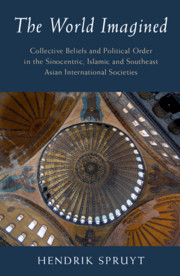 The World Imagined
The World Imagined Book contents
- The World Imagined
- LSE International Studies
- The World Imagined
- Copyright page
- Dedication
- Contents
- Figures
- Preface
- Acknowledgments
- A Note on Transliteration
- 1 Introduction
- Part I Beyond the Westphalian Gaze
- Part II The East Asian Sino-centric Order
- Part III The Islamic Cultural–Historical Community
- Part IV Collective Imagination among the Polities of Southeast Asia
- 8 The Galactic Polities of Southeast Asia
- 9 Interstate Relations and the Encounter with Colonial Powers
- 10 Conclusion
- Bibliography
- Index
10 - Conclusion
Viewing the World in One’s Own Image
from Part IV - Collective Imagination among the Polities of Southeast Asia
Published online by Cambridge University Press: 18 June 2020
- The World Imagined
- LSE International Studies
- The World Imagined
- Copyright page
- Dedication
- Contents
- Figures
- Preface
- Acknowledgments
- A Note on Transliteration
- 1 Introduction
- Part I Beyond the Westphalian Gaze
- Part II The East Asian Sino-centric Order
- Part III The Islamic Cultural–Historical Community
- Part IV Collective Imagination among the Polities of Southeast Asia
- 8 The Galactic Polities of Southeast Asia
- 9 Interstate Relations and the Encounter with Colonial Powers
- 10 Conclusion
- Bibliography
- Index
Summary
Contrary to views that these non-Westphalian polities could not adjust to material and conceptual changes, fundamental transformations occurred throughout the non-European international societies.The encounter between the universalist empires and the Western polities introduced new perspectives of inclusion and exclusion and influenced both parties. Studying collective beliefs not only provides a means to examine different patterns of international order but also serves as a mirror to contemporary preconceptions of international relations. Imputing the Western nation-state as the normal pattern of political organization leads to a process of normation---the attempt to impose that form of political community on others. Historical reflection reveals that international relations hardly consist of immutable patterns of behavior. While material conditions play an important role, the modalities through which individuals and social groups understand these phenomena occur against the template of a shared collective consciousness. Collective beliefs form a critical component for explaining state policies and are themselves independent sources of power.
Keywords
- Type
- Chapter
- Information
- The World ImaginedCollective Beliefs and Political Order in the Sinocentric, Islamic and Southeast Asian International Societies, pp. 326 - 352Publisher: Cambridge University PressPrint publication year: 2020
